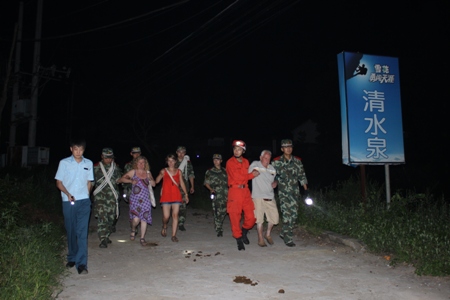‘Wild Wall’ traps six tourists

Six tourists, including three deaf visitors from Belgium, became lost on unsupervised sections of the Great Wall Sunday.
Firefighters, who came to the rescue, have said that it is too easy for unprepared visitors to wander off onto dangerous sections of "wild Wall," while local government said Monday it is doing the best it can to ensure the visitors' safety.
Four visitors, including three deaf Belgian nationals became lost on the Lianhuachi section of the Great Wall in Huairou district, after straying onto the wrong part of the Wall from the adjacent Mutianyu section.
None were injured, although all were exhausted and suffering from dehydration, especially an 85-year-old Belgian man.
"Even the young tour guide was deaf and couldn't speak in complete sentences; luckily she had the contact number of a local villager who called us for help," said Qu Hui, a publicity officer from Beijing Firefighting Department.
According to a firefighter surnamed Lu, who was in the rescue squad, the section the four were trapped on is one of the most dangerous places on the Great Wall. It took the team one hour of climbing in the mountains and walking on broken rocks to find the visitors.
"I think they were unaware they had stepped into 'wild Wall' territory where hiking is forbidden, as it was dark and there are no obvious warning signs or security guards to stop them," said Lu.
On the same day around 3 pm, two male students from Peking and Tsinghua universities were also trapped along the Jiankou section of the Great Wall. One sustained a head injury after sliding down the mountain into a 40-meter-deep valley. After a rescue effort that lasted nine hours, the pair was sent to hospital, according to a press release from the firefighting department.
"It's easy to stray onto the 'wild Wall' from Mutianyu," said Lu.
Lianhuachi lies to the east and the Jiankou section is immediately to the west of Mutianyu, and there are no barriers, he said.
Qu said Monday that in Jiankou alone in 2011, about 70 people were lost or trapped while hiking along the "wild Wall."
"They are usually inexperienced hikers like college students or foreign tourists whose guide is unfamiliar with local areas," said Qu.
"These incidents could be avoided if there were stricter supervision over sneaking onto the Wall," Qu noted.
On Monday, Yang Fengxia, the publicity director of Yanqi Township People's Government, Huairou district, said they had put warning signs at the main entrances on the Great Wall in Chinese and English.
But Yang admitted that merely posting signs has not proved sufficient to deter bold hikers, especially curious foreign visitors who want to watch the sunrise from the Wall.
"We also hired guards from villages along the Great Wall to stop people sneaking into the dangerous and unsupervised sections in the peak season of the tourism, but they are just part-time employees," said Yang.
"Hiking the 'wild Wall' causes safety concerns, as well as damage to the relics, but we just can't afford to have guards year-round as the government financial grants we get are very limited," said Yang.
The Jiankou section of the Great Wall, Haituo Mountain and Jiulong Mountain were named as the most dangerous places in Beijing for hikers, according to a 2010 research report released by local rescue teams. Six were injured and one hiker died in Jiankou that year.
However, some hikers are attracted to places which have a reputation for being dangerous, despite the safety concerns.
"People are attracted to the wildness. The more dangerous, the more appealing it is, and Jiankou is the top recommendation on search engines," said Yang Guoqing, a local hiker who has been exploring the "wild Wall" in Beijing since 2005.
"But without proper renovation and protection, I'm afraid the risks to life will only get worse, as the old bricks will get more broken after people climb on them," Yang Guoqiang told the Global Times.